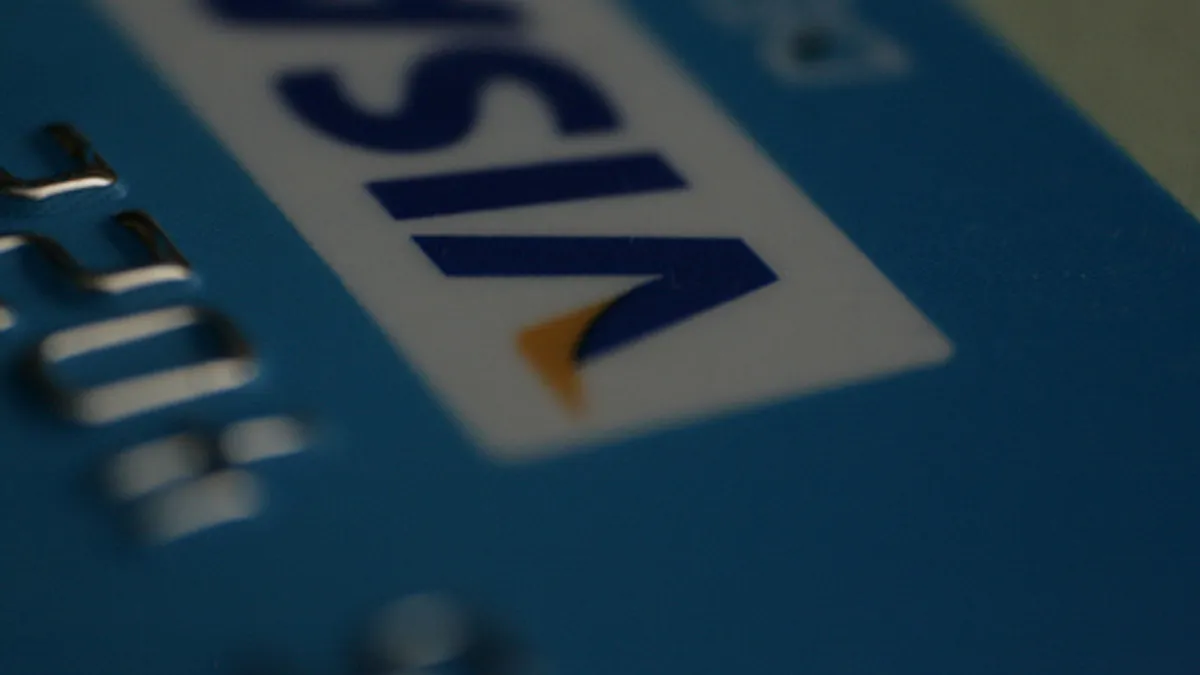Dive Brief:
-
Visa's planned $5.3 billion acquisition of Plaid has sparked antitrust concerns from the U.S. Department of Justice (DOJ), The Wall Street Journal reported Tuesday.
-
The DOJ, which is calling on witnesses as it prepares for potential litigation, is close to deciding whether it will sue to block the payment processor's takeover of the fintech, sources told the Journal. San Francisco-based Plaid connects fintech apps such as Venmo, Chime and TransferWise to customers' bank accounts.
- The department is concerned the deal, which was announced in January, could stifle competition in the payments sector, according to the Journal.
Dive Insight:
Visa and Plaid had hoped to close the deal within three to six months of the announcement. But in July, Visa said it needed more time to satisfy regulatory concerns.
"We certainly are expecting to close by the end of the calendar year and are doing everything we can to comply with any request from the regulators that are looking at it," Visa CEO Al Kelly told analysts on a conference call in July, according to The Street.
In a petition filed Tuesday, the DOJ is asking a U.S. district court in Massachusetts to require consulting firm Bain & Co. to turn over documents as part of an antitrust review, Reuters reported.
The DOJ is seeking documents that discuss Visa's strategies around pricing and competition with other debit card networks.
The DOJ may be concerned Visa's purchase of Plaid would result in a "killer acquisition" — when a legacy company purchases a smaller, innovative player to preempt future competition, said Eleanor Tyler, an analyst at Bloomberg Law.
"In this case, there's a real reason to be concerned that Visa might be acquiring Plaid to quietly throttle it," Tyler said. "[Plaid] has been upsetting Visa's 'best friends' — the issuing banks — angering them in the data category."
A number of big banks, including JPMorgan Chase and PNC, have derided Plaid's use of screen scraping — a practice that allows aggregators to take bank customers' user names and passwords, log in on their behalf, and copy and paste their account information into a third party's software — as insecure, and have taken measures to prevent it.
Chase and PNC, for example, have changed their policies and security to block aggregators like Plaid from scraping user data. Wells Fargo forces aggregators such as Plaid and Yodlee to route the customer data they pull from the bank's server through an application programming interface, giving the customer greater control.
Another bank, TD, sued Plaid this month, claiming the aggregator knowingly created a user interface that features TD's trademark, logos and green color scheme and mimics the bank's login page in an effort to "dupe" TD customers who are linking their bank accounts to payment apps into believing they are entering their personal data into the bank's platform.
A debate continues over who owns that data and whether customers have the right to share it with third parties of their choosing. The Consumer Financial Protection Bureau (CFPB), seeking feedback on the matter, issued an advanced notice of proposed rulemaking last week regarding consumers' rights to access their financial data.
"Plaid connects to a lot of neobanks that challenge the banks' business model," Tyler said. "If that's where Visa's honeypot is — their main income — then it might make sense to throttle Plaid."
Plaid's existence in the market could be seen as a threat to Visa's business model, Tyler added.
"We have these whole payment systems that don't have to go through Visa. If that materializes and matures into a way that, along with Mastercard and AmEx, they no longer have a stranglehold on payments and payment systems, then that's a big challenge to their business model," she said.
Mastercard and American Express also announced plans to acquire fintechs this year. Mastercard said it agreed to purchase data aggregator Finicity for $825 million in June, and American Express completed its estimated $850 million purchase of online lender Kabbage this month.
Visa did not respond to Banking Dive's request for comment. Plaid declined to comment.














